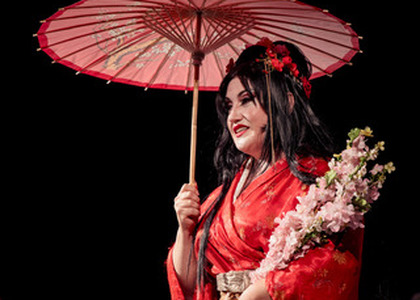> [Archived] Interviews

Interview with soprano Madeleine Pascu
Tomorrow, the 17th of October, the Bucharest National Opera dedicates the performance of Giuseppe Verdi's "Don Carlo" to the memory of baritone Nicolae Herlea, who died on the 24th of February, 2014. Soprano Madeleine Pascu talked to our colleague Ioana Țintea about this performance and the performance of Puccini's opera "Madama Butterfly" on the 18th of October, in which she will play the title.
Mrs. Madeleine Pascu, the Verdi's show "Don Carlo" directed by Mario de Carlo, staged on Thursday, the 17th of October, is dedicated to the memory of the great baritone Nicolae Herlea, a legend of the Romanian opera scene.What elements of the late artist's style and interpretation remain relevant for young singers today?
First of all, it is a great honor and responsibility to be on stage in an evening dedicated to the memory of the great baritone Nicolae Herlea. From my point of view, the elements of the maestro's style and interpretation that remain relevant for today's young singers include impeccable vocal technique, and listening to him I realize that exceptional breath control, and fluid phrasing - this is certainly very important for future singers - is needed.
The baritone Nicolae Herlea was a true ambassador of Romanian culture, with a brilliant career on the world's great stages, including the Metropolitan Theater in New York. What is it about his legacy that should inspire new generations of opera performers?
His legacy is a priceless treasure for all of us. Nicolae Herlea was, as you said, a legend of the Romanian opera scene. His style offers many important lessons for young opera singers. From what I have been told, his performances were always full of genuine emotion, because he got completely into the skin of the character; in this way, basically, provided a balance between technique and theatricality. He succeeded in combining vocal power with a special expressiveness, demonstrating that it is not only volume that counts, but also the fine nuances of interpretation. This ability to live his roles together with all the technical elements that the master left us should be an inspiration for today's new generations of artists.
On Friday, the 18th of October, you will perform the title role in Giacomo Puccini's Madama Butterfly. What are the main challenges of the role and what inspires you most in portraying Cio-Cio-San?
The role in "Madama Butterfly" and in particular the portrayal of the character Cio-Cio-San are extremely complex and challenging from several perspectives. First of all, from a vocal point of view, it is a lyric soprano role with dramatic features. It is difficult because it requires a wide ambitus, great acting talent to be able to move from delicate, almost whispered passages to moments of great intensity such as the aria "Un bel di vedremo". Emotionally, it requires a certain understanding of the psychology of the character Cio-Cio-San, who undergoes an extreme dramatic evolution - from the innocence of Act I, 15 years old and the hope of age, to the drama tragedy, and despair of the final act. Being a story of sacrifice, it is very difficult to interpret this emotional arc, which has to be authentic to have an impact on the audience.
In addition, the most important is the cultural element of fact. Cio-Cio-San is a young Japanese geisha, and the challenge is that I have to be sensitive and at the same time show respect for Japanese culture and tradition, which is very difficult. From this point of view I also had a lot of help because after I finished the Conservatory, at the age of 26, I entered the Constanța Opera, where my first big role was this Madama Butterfly, I worked with international directors and the most important for me was that I worked with a Japanese woman who was brought specially, who taught us everything about movement, gestures and helped us to understand Japanese culture.
I take it this is a role dear to your heart.
Very dear! I was given almost the whole of Act II in my second year of university by the late Maestro Hero Lupescu, who was my class teacher and who thought that at that age, even though I am young and this role is very difficult to understand and to perform from a soul point of view, he dared to do it and, since then, with him I have practically started most of Act II and we have built it together, knowing when we finished what it is about and what I should do to succeed in bringing it to a successful conclusion.
It's a tough role, it's a difficult role, and it requires a lot of technical maturity to be able to get to the end of it with your voice.
In general, how do you relate to the music of Giacomo Puccini?
He is closest to my soul. Of course, I love the other composers as well, but, in all Puccinian opera, I find myself very much at home, because I started this profession by learning to be a voice actor. And I think Puccini gives the most possibility to do this without problems and corset.
Translated by Miruna Flipache,
University of Bucharest, Faculty of Foreign Languages and Literatures, MTTLC, year II
Corrected by Silvia Petrescu














